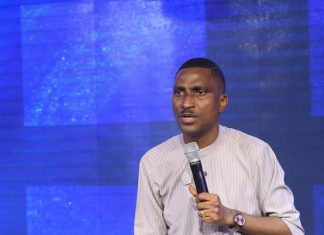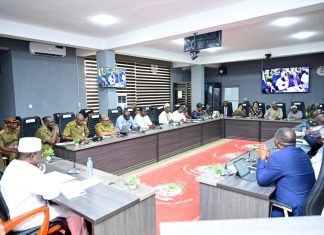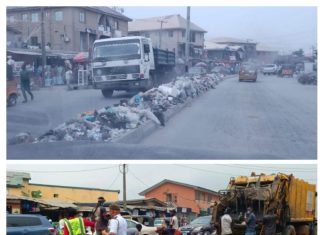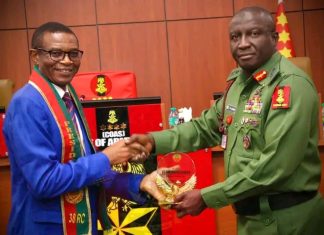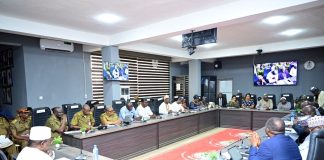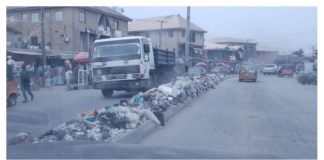Lagos State Governor, 
 Babajide Olusola Sanwo-Olu has stressed the need for Africans to harness the strength of her multi-stakeholder partnerships and leverage enterprise-driven innovations to create impact ecosystems that foster inclusive growth and recovery.
Babajide Olusola Sanwo-Olu has stressed the need for Africans to harness the strength of her multi-stakeholder partnerships and leverage enterprise-driven innovations to create impact ecosystems that foster inclusive growth and recovery.
Sanwo-Olu said this today while speaking at the Africa Social Impact Summit (ASIS), with the theme “Global Vision, Local Action: Repositioning The African Development Ecosystem for Sustainable Outcomes’’ at the Eko Convention Center, Eko Hotels and Suites, Victoria Island.
Represented by the Deputy Governor, Dr. Kadri Obafemi Hamzat, Sanwo-Olu noted that Africa must come together, with a renewed spirit of collaboration, innovation, and determination, to build a prosperous and sustainable Africa for all, thereby calling on the private sector to lead in driving the change.
He said, “We must come together, with a renewed spirit of collaboration, innovation and determination, to build a prosperous and sustainable Africa for all. I call upon the private sector, with its scale, sustainability, and innovation, to take the lead in driving change. We must harness the strength of our multi-stakeholder partnerships and leverage enterprise-driven innovations to create impact ecosystems that foster inclusive growth and recovery”.
Sanwo-Olu added that the expected outcome of ASIS 2.0 are far-reaching and transformative, as he charged stakeholders and partners to seek to build a result-oriented global and regional partnership that will fast-track the Sustainable Development Goals’ implementation, as they represent a powerful force for positive change and it is through collaboration and partnership that they can overcome challenges and create a lasting impact”
“As we emerge from the shadows of the COVID-19 pandemic, it is vital that we foster high-level discussions, share knowledge, and leverage our collective expertise to build a sustainable future for Lagos, Nigeria, and Africa”, he concluded.
Sanwo-Olu stated that the summit seeks to reshape Africa’s impact solutions and accelerate the achievement of the United Nations Sustainable Development Goals (SDGs), adding that his administration upon assumption of office in 2019, established the Office of Sustainable Development Goals and Investment to align the state development project (THEMES) with the global development agenda (SDGs).
He added that it also aims to attract investment and partnership for the execution of SDGs-related projects as well as monitor and measure the outcome and impacts of all projects relevant to SDGs in collaboration with other relevant agencies of government.
In his keynote address, the Senior Special Adviser on Industrialization to the President of the African Development Bank, Prof. Oyebanji Oyelaran-Oyeyinka outlined certain indexes Africa should prioritize for her socio-economic and political development.
Among his recommendations were agro-economic based; the need for industrialization, especially for the production of the continent’s basic needs. According to him, no nation can develop without paying attention to the agricultural sector. He was of the view that developing nations, especially Nigeria, Niger, the Democratic Republic of Congo (DRC, among others, have more natural resources and available lands than the developed nations, “despite this, African countries are yet to make use of these natural resources for their development.
“Nigeria has gas, crude oil, rich available lands, but still importing refined oil, wasting away our gas through flaring, while the lands are not utilized to the maximum level that can produce food supplies to the citizenry”. He said African countries should migrate from being a consumption nations to production countries by making sure they produce what they eat and eat what they produce.
Prof., therefore, urged the promoter of the event to proffer unviable solutions that are capable of catapulting Nigeria’s economy into a global reckoning, noting that it is time to rejig the nation’s economic policy.
He specifically advocated for a shift from subsistence agricultural practice to mechanized one, where substantial hectares of land would be cultivated.
This is another opportunity to own a faster-loading website to expand your business and take it digitally online. Meet the best website designer/master coder for any kind of website. Contact them now it is affordable Chat now: 09077260922






